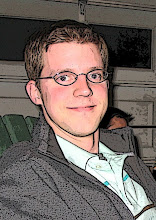This is the second installment of my "Advice from the Top" column. Regular readers of my blog recall the great advice that Denise Graveline gave us a few months back.
I recently interviewed Richard Toth, APR, from the University of Maryland. I focused on younger pr pros, but this Q&A can really apply to any entry level PR pro. You can read this interview here, or over at Forward where the post has already gotten a few positive responses.
Thanks to Professor Toth for taking the time to speak with me. I'll work on meeting up with more experienced pros for future "Advice from the Top" columns.
I recently sat down with Richard Toth, APR, Fellow PRSA, and lecturer at the University of Maryland-College Park. For my first post, I thought I’d share some of the thoughts from one of my former public relations professors. Let’s jump right with some young pr pro questions…
What’s your advice for recent public relations graduates in terms of the some of the skills you find that young PR pros lack?
New PR pros and students need to demonstrate and follow through on basic curiosity about tactical and strategic communications — the classic five w’s and h on a broad and flexible range of topics. They need to absorb and sort lots of information, going beyond the superficial to ponder and position the “what if?” of situations. Beyond that philosophical big picture, I suggest students and new pros should:
- Read, listen, observe, ask, write, edit, practice more. In a variety of media — traditional, mainstream and otherwise.
- Take every opportunity for feedback and to explore and propose options.
- Take what I call positive risks. Dare to be different, positively.
- Network, collaborate, participate, mentor and be mentored. Getting started early in organizations — such as PRSSA, PRSA, IABC, their local chapters and members. Such activity can help with all of the recommendations above and below. Don’t forget personal, face-to-face interaction. Follow up with personal thank-you notes and updates. Add value to a contact and relationship as a deposit in the bank of goodwill — for both the giver and receiver.
- Keep a file of and leverage ideas, examples, stories, contacts, quotes, testimonials, results, successes, experiences, Web sites, blogs, etc. Then connect them to each new situation, challenge or opportunity.
How can public relations education incorporate some of these ‘new social media’ tools like podcasting, blogging, etc. into the curriculum?
As you know, John, as a student in my class a few years ago — you are now using technologies and media that really weren’t around to teach in 2004. That’s why it’s more important for professors and students to know and practice the basic principles and theories with traditional and existing media and technologies, then adapt them as new technologies are introduced, implemented and fine-tuned.
The demonstration I use in class: You and your skills need to be fluid, like water. As professors, we can bring new and more seasoned pros and researchers to orient us to the cutting edge, but not dwell on what may be the latest technology — because it may change the next day, based on your situation, organization, client, goals, experience.
Finally, an interesting exercise is to project some best-case and worst-case scenarios for the future of communication and technology. One of my favorite sites for students to view a video and ponder for challenges and opportunities was recommended by one of our regular guest speakers in the public relations program at the University of Maryland-College Park, David Forstrom of Connect PR.
What are some of differences between starting out in PR in a big agency, small shop, or in-house? There seems to be a lot of debate out that topic and I’d be eager to get thoughts from someone who has had a variety of pr experiences.
Again, just as in technologies and skills — flexibility and variety are keys. I recommend a good mix of different experiences and environments, especially during the first half of a public relations career. Depend on professors, mentors, colleagues, your heart and network for specific advice. But never burn your bridges, nor walk away from any organization or client unless the decision-maker and you can say you did your best. Your individual reputation for dependability, credibility and trust is all you can take with you wherever you go. Preserve, protect, maintain and build on your reputation and relationships — throughout your career.
On a personal note, I encourage students and young pros to avoid limiting their focus to just public relations and communications. Learn the ops side of all businesses and position yourself to be ready for job and career burnout, cutbacks, promotions, demotions, moves, etc. Your careers and circumstances are likely to change more and last longer than my baby boomer generation. Know the business-side of organizations and clients, because you might want or have to do it. Be a generalist with select specialties to differentiate you from and for the market.
Finally, I look forward to students and new pros giving back at least as much — and ideally, more — than they received, for the future of the profession, its education, standards and practitioners.



No comments:
Post a Comment